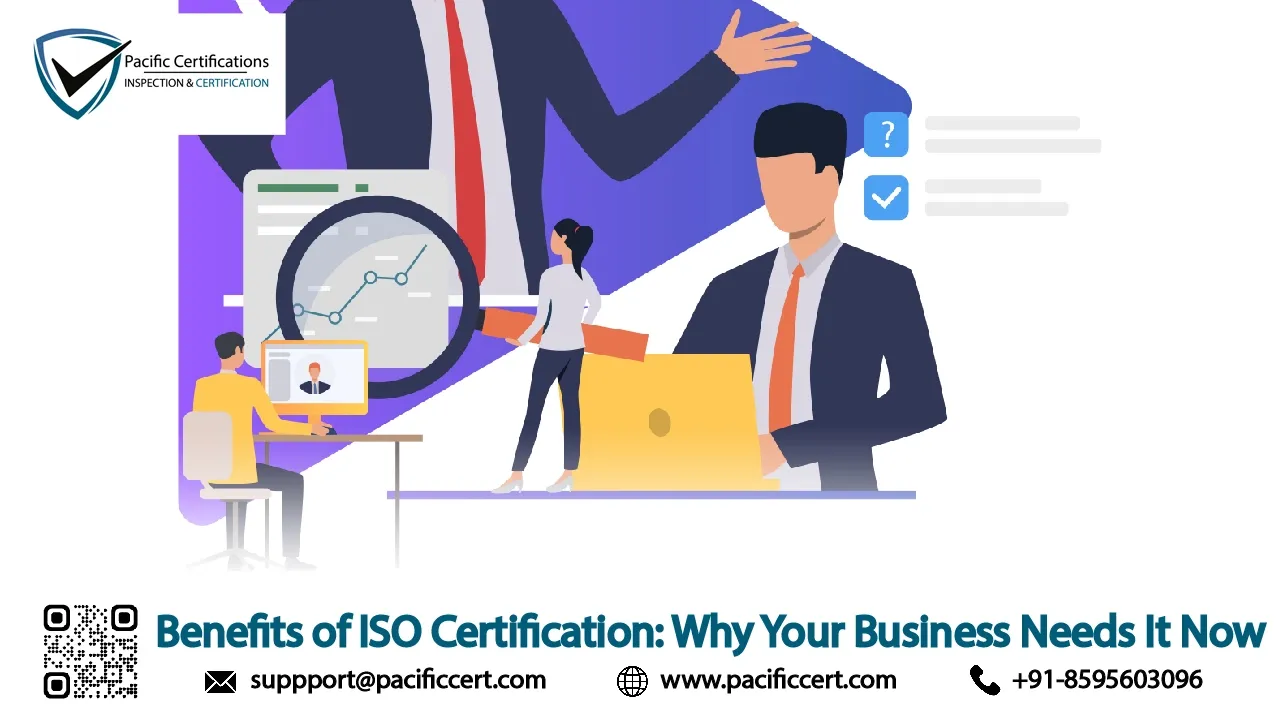Benefits of ISO Certification: Why Your Business Needs It Now

ISO certification is more than just a quality mark, it is a whole system that allows businesses to improve processes, improve productivity, and improve legitimacy with customers and stakeholders. Whether it’s in manufacturing, healthcare, IT or otherwise, ISO certification offers your business an organized way to comply with regulations at an international standard level, along with constant improvement. In this blog, we will break down the top benefits of obtaining ISO Certification and why you should do it as a top priority in your business this year.
For assistance, contact us at [email protected]
Introduction
In today’s competitive business environment, ISO certification is a valuable tool for organizations that seek to improve operational aspects and enhance their reputation. ISO (International Organization for Standardization) standards are globally recognized as world-class standards for quality, safety, and operational excellence. When it comes to ISO certification, it is not just about meeting regulatory obligations and requirements, it is about your organization demonstrating its commitment to risk management, customer satisfaction and continuous improvement
Improved Operational Efficiency
One of the most notable advantages of ISO certification is enhanced operational efficiencies. By implementing ISO standards, businesses develop standard processes and methods; this can lead to greater consistency and fewer errors when staff performs tasks. Standard practices lead to less inefficiencies, waste, and duplication of work. The ISO focus on continuous improvement is vital, as it ensures that processes are continually evaluated for effectiveness and efficiency. Over time this leads to consistent improvements in operations. For instance, ISO 9001 (Quality Management), gives organizations the tools to identify bottlenecks, streamline process steps and workflow, and use standard practices, all of which enhance productivity and reduce or lessen operational costs.
Greater Customer Satisfaction
ISO certification aids customer satisfaction by ensuring organizations deliver quality products and services that meet or exceed customer satisfaction. As an example, ISO 9001 emphasizes the importance of customer feedback and maintaining quality standards in meeting customer needs. Essentially by following ISO standards an organization can provide evidence of its ability to provide higher quality products and/or services, better providing for customer satisfaction, building customer loyalty through satisfaction, leading to better retention of customers
Enhanced Market Credibility and Reputation
ISO certification serves as a mark of quality that sets your business apart from competitors. It provides third-party verification that your organization adheres to internationally recognized standards. This is crucial in industries where safety, quality, and compliance are critical, such as healthcare, manufacturing and information security.
Having ISO certification can give your business a competitive edge in the market by showcasing your commitment to maintaining high-quality standards. Customers, suppliers and other stakeholders are more likely to trust and engage with an organization that has ISO certification, as it demonstrates reliability and accountability.
For assistance, contact us at [email protected]
Risk Management and Compliance
ISO standards offer a framework for organizations to identify, assess, and manage an organization's risks, such as ISO 27001 (Information Security Management) and ISO 31000 (Risk Management). Using ISO standards provides businesses with an opportunity to mitigate disruption to operations, reduce circumstances for data leaks, and avoid inaccuracies that could legally affect business behaviour.
Due to many ISO standards being directly aligned with local and international regulations, ISO will ensure organizations maintain compliance. For example, ISO 14001 (Environmental Management) will demonstrate compliance with environmental regulations, while ISO 45001 (Occupational Health and Safety) will show compliance with regional safety regulations.
Access to New Markets
ISO certification allows access to new markets that would have been previously impossible. ISO certification will provide clients and potential partners confidence to work with your organization because they have a climate of using a certified organization. In many industries, organizations' suppliers and contractors are required to be ISO certified. Instead, we can take aerospace, automotive and food production for example.
If you are sourcing food, it is likely that through ISO 22000 (Food Safety Management) your business can demonstrate that you meet safety & hygiene standards. ISO 13485 (Medical Device Quality Management) is essential to medical device manufacturers looking to sell a product internationally because ISO certification increases visibility in a global marketplace. ISO certification is a valuable point of difference for businesses.
Employee Engagement and Motivation
ISO Certification is not only valuable to customers and external stakeholders; it has positive impacts on employees too. Having a more structured and clear approach to processes increases engagement from employees, since they can see their role and responsibility in the overall picture. If employees acquire processes that have been defined to them, they will be more motivated in achieving outcomes set by the organization. Furthermore, historically recognized ISO standards of employee health and safety (ISO 45001) directly contribute to a healthier and safer workplace, which enhances job satisfaction and morale.
Continuous Improvement and Innovation
ISO certification contributes to the development of a company culture that fosters continuous improvement, and continuous improvement is crucial for longer-term business. The emphasis on regular evaluation, feedback and adjustments assure that businesses perform to stay competitive and innovative.
The use of ISO standards also means that organizations must remain flexible in order to address new challenges, and must respond to changing customer needs. The emphasis on innovation allows organizations to ensure they leverage trends in their market, improve products or services and remain on the leading edge of the issues impacting their particular industry.
Streamlined Supplier Relationships
ISO certification has a process of providing a common context for how performance is expected, the quality standards for their action and procedures, and a basis for communication therefore improve the relationship with suppliers. Suppliers who are ISO certified understand the quality expectations for their work and can plan their processes around the specific needs of your business.
ISO 9001 and ISO 14001 are helpful in establishing expectations for the leadership related to supplier quality, critical to the ongoing management of supplier relationships. This will facilitate a common understanding of the quality requirements and management practices on each side so the two organizations can conduct their respective business.
Better Decision Making
We can say this with a high level of confidence; ISO certification provides the organization with the tools, systems and processes to make more informed and ultimately data led decisions. The ISO standards require organizations to measure their processes and systems, analyse the data, and then evaluate how they performed in relation to the data they generated. In executing the expectations of ISO, businesses are able to look at their business and assess with clarity what is working well, and what needs to change.
Contact Us
Pacific Certifications can guide your organization through the ISO certification process. Whether you're looking to implement ISO for the first time or need support in maintaining certification, our team of experts is here to assist you every step of the way.
For assistance, contact us at [email protected].
Visit our website at www.pacificcert.com.
Ready to get ISO certified?
Contact Pacific Certifications to begin your certification journey today!
Read more: Pacific Blogs

